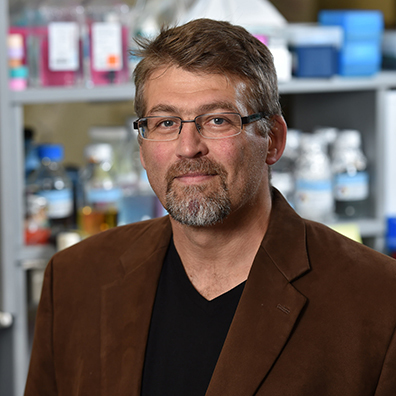Michael Ferdig Professor

Research Interests:
Malaria takes an enormous toll on the poorest regions of the world with the most lethal malaria species, Plasmodium falciparum, responsible for up to 500 million clinical cases and nearly a half-million deaths annually. Malaria continues to thrive in many regions around the world, largely due to the continuous emergence and spread of drug resistance. The new ‘genomics’ era promised a pipeline to new discoveries; however, breakthroughs in disease control have been slow to come. The Ferdig lab is building a foundation of approaches to leverage whole-genome information for new attacks against the malaria parasite.
Our approach is built on a few key early observations:
- Drug resistance is best understood not as a simple single gene mechanism, because even major drug resistance genes function in the context of other genes, i.e. genetic background is important
- Extensive relationships exist among malaria parasite drug susceptibilities and growth rates that reflect genome-wide co-adaptive processes and overlapping genetic mechanisms
- Natural genetic variability, as displayed by genetic crosses and outbred populations, provides valuable views of co-adapted systems
My lab continues to develop the tools and computational framework to reveal and mine the genetic architecture of complex traits. Our quantitative trait locus (QTL) mapping approach combined with the power of genomic information and associated tools is well-suited for discovery of key gene interactions, a crucial component of ever-emerging drug resistances.
Biography:
- Professor, Biological Sciences, University of Notre Dame, IN 2014-Present
- Associate Professor, Biological Sciences, University of Notre Dame, IN 2008-2014
- Assistant Professor, Biological Sciences, University of Notre Dame, IN 2001-2008
- Post-doctoral Fellowship, NIAID NIH 1997-2001
- Postdoctoral Fellow, University of Wisconsin-Madison, WI 1997
- Ph.D., University of Wisconsin, WI
- M.S. University of Nebraska-Lincoln, NE
- B.S. University of Nebraska-Lincoln, NE
Recent Papers:
- Vaughan AM, Pinapati RS, Cheeseman IH, Camargo N, Fishbaugher M, Checkley LA, Nair S, Hutyra CA, Nosten FH, Anderson TJ, Ferdig MT, Kappe SH. (2015) Plasmodium falciparum genetic crosses in a humanized mouse model. Nat Methods. Jul;12(7):631-633.
- Siwo GH, Tan A, Button-Simons KA, Samarakoon U, Checkley L, Pinapati RS, Ferdig MT. (2015) Predicting functional and regulatory divergence of a drug resistance transporter gene in the human malaria parasite. BMC Genomics. Feb 22;16(1):115.
- Lewis IA, Wacker M, Olszewski KL, Cobbold SA, Baska KS, Tan A, Ferdig MT, Llinás M. (2014) Metabolic QTL analysis links chloroquine resistance in Plasmodium falciparum to impaired hemoglobin catabolism. PLoS Genet. 10(1):e1004085. Epub 2014 Jan 2.
- Cheeseman IH, Miller BA, Nair S, Nkhoma S, Tan A, Tan JC, Al Saai S, Phyo AP, Moo CL, Lwin KM, McGready R, Ashley E, Imwong M, Stepniewska K, Yi P, Dondorp AM, Mayzay M, Newton PN, White NJ, Nosten F, Ferdig MT, Anderson TJ. (2012) A major genome region underlying artemisinin resistance in malaria. Science. 336(6077):79-82.
- Samarakoon U, Gonzales JM, Patel JJ, Tan A, Checkley L, Ferdig MT. (2011) The landscape of inherited and de novo copy number variants in a Plasmodium falciparum genetic cross. BMC Genomics. 12:457.
- Tan JC, Miller BA, Tan A, Patel JJ, Cheeseman IH, Anderson TJ, Manske M, Maslen G, Kwiatkowski DP, Ferdig MT. (2011) An optimized microarray platform for assaying genomic variation in Plasmodium falciparum field populations. Genomic Biol. 12(4):R35.
- Samarakoon U, Regier A, Tan A, Desany BA, Collins B, Tan JC, Emrich SJ, Ferdig MT. (2011) High-throughput 454 resequencing for allele discovery and recombination mapping in Plasmodium falciparum. BMC Genomics. 12:116.
- Patel JJ, Thacker D, Tan JC, Pleeter P, Checkley L, Gonzales JM, Deng B, Roepe PD, Cooper RA, Ferdig MT. (2010) Chloroquine susceptibility and reversibility in a Plasmodium falciparum genetic cross.
- Mol Microbiol. 78(3):770-87.
- Reilly Ayala HB, Wacker MA, Siwo G, Ferdig MT. (2010) Quantitative trait loci mapping reveals candidate pathways regulating cell cycle duration in Plasmodium falciparum. BMC Genomics. 11:577.
- Gonzales JM, Patel JJ, Ponmee N, Jiang L, Tan A, Maher SP, Wuchty S, Rathod PK, Ferdig MT. (2008) Regulatory hotspots in the malaria parasite genome dictate transcriptional variation. PLoS Biol. 6(9):e238.